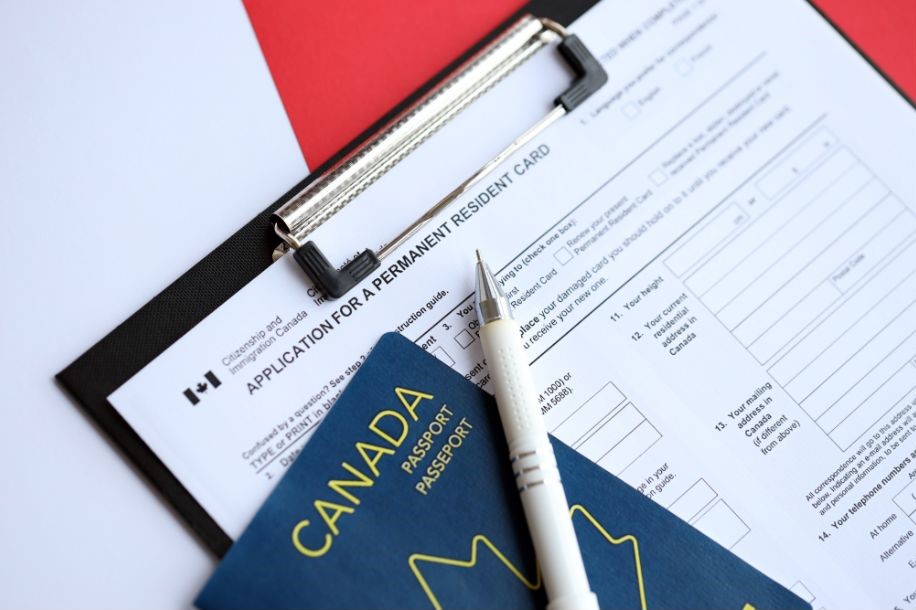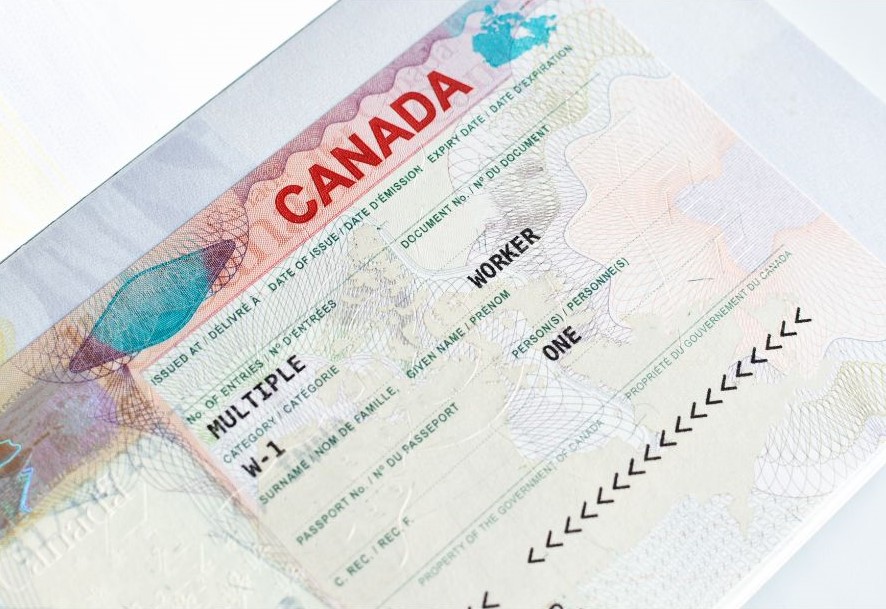Canada Work Permits
Eligibility to Work in Canada

If you're a foreign national looking to work in Canada, you will usually need a work permit, though there are some exceptions.
Generally, you will need a job offer from a Canadian employer to apply for a work permit unless you fall under specific categories that don't require a Labour Market Impact Assessment (LMIA) or a job offer.
These categories can include recent graduates from a Canadian Designated Learning Institute or the spouse of someone already working or studying in Canada on a valid permit.
Canada Work Permit Eligibility
To apply for a work permit in Canada, you must usually meet the following requirements:
- Intent to Leave: You must show your intention to leave Canada once your work permit expires.
- Financial Support: You must prove you have sufficient funds to support yourself and any family members during your stay in Canada and to return home.
- Clean Record: You must have no criminal record or health issues.
- Valid Job Offer: You must intend to work for a qualifying employer.
- Supporting Documents: You must be able to provide the necessary documents to support your eligibility to enter and work in Canada.
Obtaining a Canada Work Permit
A work permit in Canada usually requires a job offer from a Canadian employer. The process for obtaining a work permit can vary depending on the type of work permit and whether you need a Labour Market Impact Assessment (LMIA).
There are two main types of work permits:
- Closed (Restricted) Work Permits: These are employer-specific.
- Open Work Permits: These allow you to work for any employer in Canada.

Types of Canadian Work Permits
The type of work permit a foreign national may apply for in Canada depends on several factors, including the specific job, the duration of employment, and whether a Labour Market Impact Assessment (LMIA) is required.
Canada Work Permit Categories
1. Requiring a Canadian Labour Market Impact Assessment (LMIA)
These Canadian work permits need a positive LMIA from Employment and Social Development Canada (ESDC). An LMIA confirms that there is a need for a foreign worker to fill the job and that no Canadian worker is available.
- Temporary Foreign Worker Program (TFWP): Allows employers to hire foreign nationals to fill labour shortages. The TFWP ensures that overseas workers employed in Canada receive the necessary rights and protections to work lawfully. Employers can hire temporary foreign workers through several specific categories under the TFWP:
- Foreign Academics
- High-Wage Workers
- Low-Wage Workers
- Foreign Agricultural Workers
- Global Talent Stream
- In-Home Caregivers
- Facilitated LMIA (Quebec): Quebec has a simplified process for hiring foreign workers. Unlike the standard LMIA process, where employers must prove they have advertised the job to Canadian citizens and made efforts to hire locally, the facilitated LMIA process in Quebec allows companies to skip this requirement. This makes it easier for employers in Quebec to hire foreign workers without demonstrating local recruitment efforts.
- Global Talent Stream (GTS):) The GTS programme aims to attract highly skilled talent from around the world, supporting Canada's economic growth and innovation. The GTS is divided into two categories:
- Category A: Targets high-growth companies referred by a designated referral partner and need unique and specialised talent to scale quickly.
- Category B: Focuses on employers seeking to fill positions listed on the Global Talent Occupations List, which identifies in-demand jobs requiring specialised skills.
2. Canada LMIA-Exempt but Requiring a Job Offer
Certain work permits are exempt from the LMIA requirement, but a job offer is still required.
- International Mobility Program (IMP): This programme offers Canada certain highly skilled workers economic, social, or cultural benefits. Certain conditions justify exemptions from the Labour Market Impact Assessment (LMIA) process, particularly when:
- The employment provides economic, social, cultural, or other significant benefits to Canada.
- Similar benefits are extended to Canadian citizens and permanent residents abroad.
To hire a foreign worker through the IMP, a Canadian business must follow these three steps:
- Confirm Eligibility: Ensure the foreign worker qualifies for an LMIA exemption under the IMP.
- Pay the Compliance Fee: Submit the compliance fee.
- Submit the Job Offer: Formally submit the job offer through the IMP’s online portal.
- NAFTA (now USMCA) Work Permits: Is an easier path for professionals from the US or Mexico to obtain work permits. To hire a professional from the US or Mexico under the United States-Mexico-Canada Agreement (USMCA, formerly NAFTA), a Canadian employer must ensure the candidate falls into one of the following four categories:
- USMCA Professionals: Individuals in specific professions listed under the agreement, such as engineers, scientists, and accountants, who meet the qualifications for their occupation.
- Intra-Company Transfers: Employees of multinational companies transferring from a US. or Mexican branch to a Canadian branch, provided the company has employed them for at least one year.
- USMCA Investors: Individuals making substantial investments in a Canadian business, allowing them to enter Canada to develop and direct the investment.
- Traders or Business Visitors: Individuals engaging in substantial trade of goods or services between the US/Mexico and Canada or those visiting Canada for business purposes without entering the Canadian labour market.
- CETA Work Permits: The Comprehensive Economic and Trade Agreement (CETA) between Canada and the European Union (EU) supports business operations and employment opportunities between the two regions. Under the CETA, highly skilled European workers may qualify for a Canadian work permit without needing a Labour Market Impact Assessment (LMIA). EU citizens can gain work permits in Canada through four categories:
- Business Visitors
- Investors
- Intra-Company Transferees
- Contractual Service Suppliers and Independent Professionals
- Intra-Company Transfers (ICT): For employees of multinational companies being transferred to a Canadian branch. To be eligible, the employee must have worked for the company for at least one year within the last three years. An LMIA (Labour Market Impact Assessment) is not required for an intra-company transfer under agreements like the USMCA (formerly NAFTA). This significantly speeds up the process of companies transferring key employees globally.
3. Canada Open Work Permits (No LMIA or Job Offer Required)
Some work permits don't require an LMIA or job offer, allowing you to work for any employer in Canada.
- Post-Graduation Work Permits (PGWP): For graduates from designated Canadian educational institutions, the PGWP allows you to live and work in Canada for up to three years after graduation.
- Spousal Sponsorship: For spouses of individuals working or studying in Canada.
- International Experience Canada (IEC): For young people from specific countries to work temporarily in Canada. The IEC programme operates through a random draw, meaning not all applicants are successful. An IEC work permit allows you to live and work in Canada for up to one year. The Canada IEC offers has three programmes, each with its own requirements and work authorisation:
- Working Holiday: Provides an open work permit, allowing participants to work for any employer in Canada.
- Young Professionals: Offers an employer-specific work permit for those seeking professional work experience in their field of study or career.
- International Co-op Internship: Provides an employer-specific work permit for students needing work experience as part of their academic curriculum.
- Bridging Open Work Permit (BOWP): This allows those already in Canada to extend their Canadian work permit while awaiting a decision on their permanent residency application. Typically, open work permits allow foreign workers in Canada to work for any employer.

Documents Required for a Canada Work Permit
The specific documents needed depend on the work permit you're applying for. Typical documents include:
- A valid passport or travel document
- Recent photos
- Completed application forms
- Proof of sufficient funds
- Invitation letter from a Canadian employer (if required)
- Job offer letter (if required)
- LMIA (if required)
- Medical exam results (if requested)
- CV/Résumé
- Proof of job status in Canada (if required)
- Marriage certificate (if required)
- Copies of educational credentials
- Payment receipts for applicable fees
Processing Time for Canada Work Permit Applications
Processing times for Canada work permits vary depending on the type of work permit and your country of citizenship. However, they generally take a few weeks, but processing time in Canada can be extended to a few months.
Police Clearances and Medical Exams For a Canada Work Permit
Depending on the duration of your intended stay in Canada and the nature of your work, you may need a police clearance certificate and a medical exam. These requirements ensure that you do not pose a risk to Canadian citizens.
Common Reasons for Canada Work Permit Refusal
Your Canadian work permit application may be refused if:
- You don't meet the eligibility requirements.
- You are inadmissible to Canada due to criminal or security reasons.
- You pose a health or safety risk.
- You fail to convince the visa officer that you will leave Canada after your permit expires.
- You cannot prove that you can perform the job adequately.
For further assistance with your Canada work permit application, consider consulting with an immigration professional.


Secure Your Canada Work Permit with Expert Guidance
Need a Canada work permit? Our experts simplify the process, ensuring your application is smooth and successful. Start your career in Canada today!
Need a Canada work permit? Our experts simplify the process, ensuring your application is smooth and successful. Start your career in Canada today!




